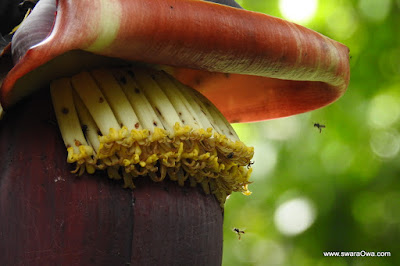 |
| Stingless bee visiting flower of crop |
Buzzzz…zzzzz no we
can’t hear the bee flying, this is tiny bee, size as flies, no sting, role as pollinators
and producing honey too, Stingless bee!!. We have done shared our knowledge
and gain new experience on meliponiculture
in the habitat of critically endangered primates. Located in Kemuning village,
Temanggung regency, Central Java, this site is recognized as habitat of Javan
slow loris, first time we discover in this area in 2013 (read here for the report). After we found the javan slow loris existed, students continue to
do research in this area. And now a conservation organization (Javan Wildlife Institute) initiated by Wildlife
Lab of Forestry Faculty, Gadjah Mada
University continue the fieldwork, not only academic research but also assist
people of Kemuning to protect and generate alternative income.
 |
| Shadegrown coffee habitat of Javan slow loris |
As we know wildlife hunting is the main threats for the
biodiversity in Kemuning forest, we try to develop solution to increase their
knowledge and capacity to maintain sustainable forest product. We have been
working since last year to manage stingless bee honey from the Javan gibbon
habitat, and now we try to introduce this scheme in the kukang habitat. Mainstreaming
conservation of pollinators and introducing management of the stingless bee
honey production.
 |
| Stingless bee honey |
On Saturday and Sunday (21/22 January 2017) organized by
JAWI we conduct training for villagers in Kemuning, and there are 10 participants
from the Kemuning village to join in the two days training. Our team give an
introduction and share experience on stingless bee, honeys and their
relationship with crops and forest habitat. Introductory about native bees and
it’s role in our environment were emphasized in the discussion with the
participants. Moreover, this bee is producing honey that very healthy and
economically viable.
 |
| knowledge sharing about stingless bee |
This training is intended to bring some long-term solution
to conserve forest as habitat of endangered animals but also give real example
for sustainable forest product who provide sustainable income. Next activities
is we will active to encourage participants to manage bees colonies and give
direct assistant on marketing strategy for the stingless bee honey.
 |
| field practice, how to manage stingless bee colony |


nice....kaka kaka...2017 mulai dengan lebah lebah biar alam makin hijau. sebuah berita baik.
ReplyDelete